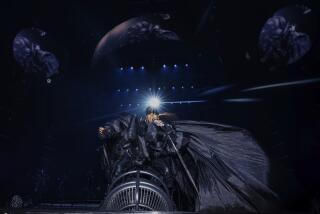Fast-rising artist Billie Eilish shows pop’s future has arrived
A few days after the school shooting in Parkland, Fla., 16-year-old singer-songwriter Billie Eilish recalled watching clips of young survivors organizing for gun control, just hours after nearly being killed in their classrooms. Eilish was deeply moved, but the reaction from certain sordid corners of the internet unnerved her.
“Can you imagine being a teenage girl, and going to school and watching your friends die in front you at the hands of a kid you knew? And then you speak out about it and have half the country hating you and sending you death threats?” Eilish said, on the road between dates of a European tour.
“But seeing girls standing up for themselves and saying what they mean when some ugly old white dude is trying to tear them down is amazing,” she added.
For anyone wondering if the Parkland teens’ fearless, uncompromising push for change is, in fact, a generational shift, Eilish adds to the case that it is.
At 16, she’s sold out two hometown shows at the El Rey Theatre, released one of the year’s most interesting and inventive pop records (the EP “Don’t Smile at Me”), and has an Interscope deal for a full-length that could put her alongside Lorde and Dua Lipa as young women driving the future of pop on their own terms.
All while taking absolutely no guff from ugly old white dudes while doing it.
Eilish, an L.A. native who grew up singing in the Los Angeles Children’s Chorus, had an unexpected streaming hit with her 2016 single “Ocean Eyes,” a plaintive ballad at the sweet spot between Lana Del Rey and the drum-machine drag of Portishead.
A pair of music videos for it — a foggy, locked-off shot of her singing alone in the official one, followed by a virtuosic modern-dance version — cleared 10 million plays in months, and the single now clocks in at near 40-million streams on Spotify.
Almost immediately, the high-schooler had to meet new expectations from a major label who saw a potential star. Eilish had long written and produced with her brother Finneas O’Connell, and while the two had grown up in the entertainment biz (O’Connell has acted in “Glee” and “Modern Family”), they now had to document this rising young singer as she figured out her worldview in real time.
“It’s definitely changed,” she said, of her songwriting relationship with her brother. “We started writing just because we could, there was no ‘You have to do this.’ But now we’re more aware of all that, for better or worse. There’s more pressure, but I’ll always make exactly what I want.“
To judge by the range and ambition of “Don’t Smile at Me,” she hasn’t given an inch. The songs veer from the deliciously misanthropic murder ballad “Bellyache” to the loose-limbed, goth-infused R&B of “Copycat” and “Watch.” A highlight is “My Boy,” a jazzy torch song with some of the finest lyrical misandry available to stream right now (seriously, the bridge goes “Alright dude, go trip over a knife”).
Eilish has a sense of humor and self-awareness about such songs. “I’ve also written from the perspective of people I’ve done a lot of damage to, and it’s opened my eyes to how my actions are seen. Writing is a way to take that in,” she said. But perhaps it’s that exact ferocity that let her make a record like this.
“Everyone who has helped me has really listened,” she said. “It’s rare for anyone to value the opinions of a teenage girl. I’ve always done whatever I want and always been exactly who I am. So many people get taken advantage of, but I wasn’t.”
As Eilish works up to her debut LP, she knows she’s changing as a person almost as fast as her writing can keep up. It’s hard enough to get to this career point at any age, let alone figure out your musical mission statement in your midteens. “If you think too rationally about it, it’ll drive you crazy,” she said.
But given all the tragedy happening around her peers every day, maybe there’s no time to wait and see.
“In the public eye, girls and women with strong perspectives are hated. If you’re a girl with an opinion, people just hate you,” she said. “There are still people who are afraid of successful women, and that’s so lame. What’s the point of pleasing other people? You’ve got to get out and change the world, and we’re the generation that’s going to step into that.”
But then, at the thought of those angry old white dudes, she couldn’t resist one last twist of her knife.
“If I make music and people hate it, you know, whatever,” she said. “ I’ll die someday and one day they will too.”
For breaking music news, follow @augustbrown on Twitter.
ALSO:
More to Read
The biggest entertainment stories
Get our big stories about Hollywood, film, television, music, arts, culture and more right in your inbox as soon as they publish.
You may occasionally receive promotional content from the Los Angeles Times.











